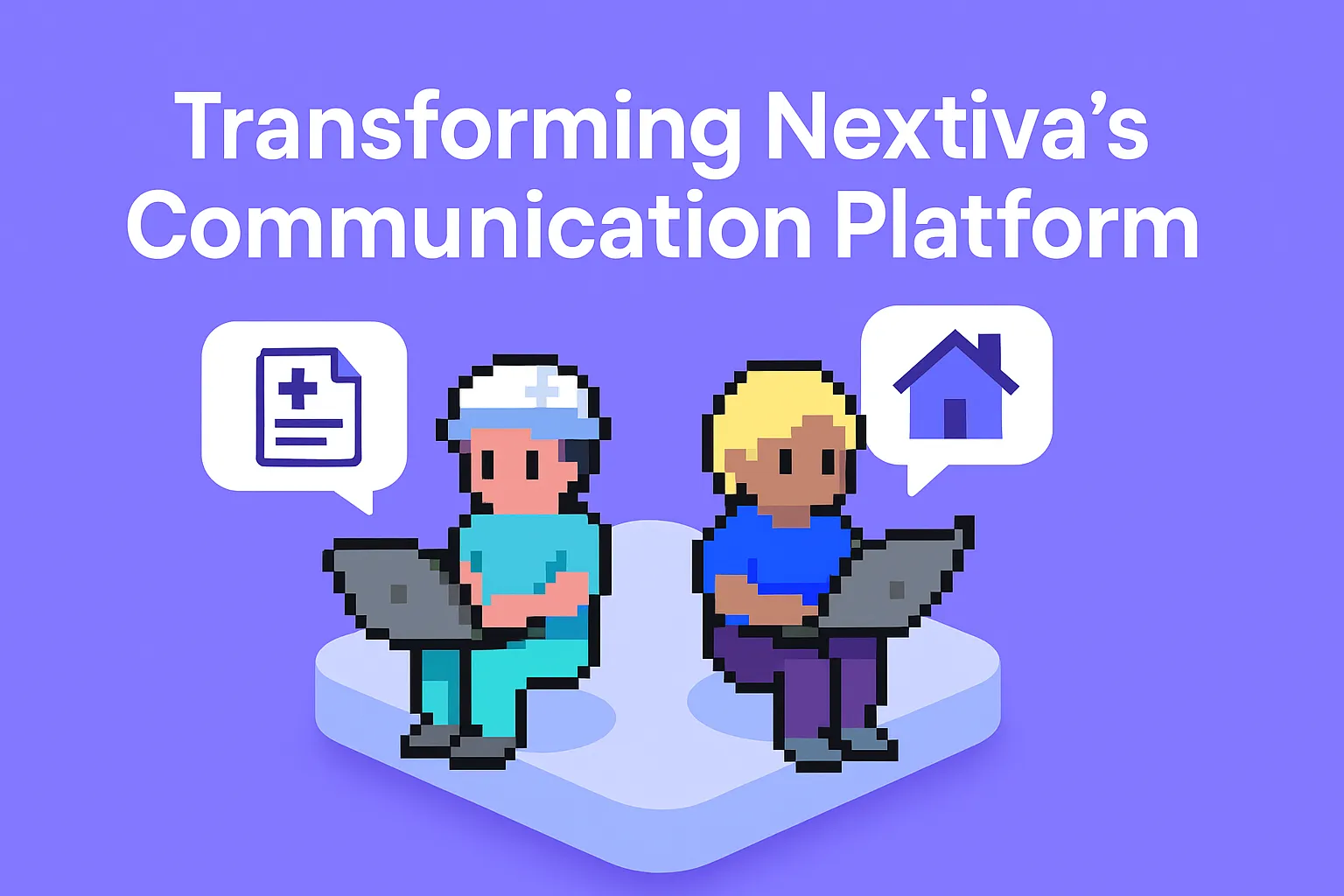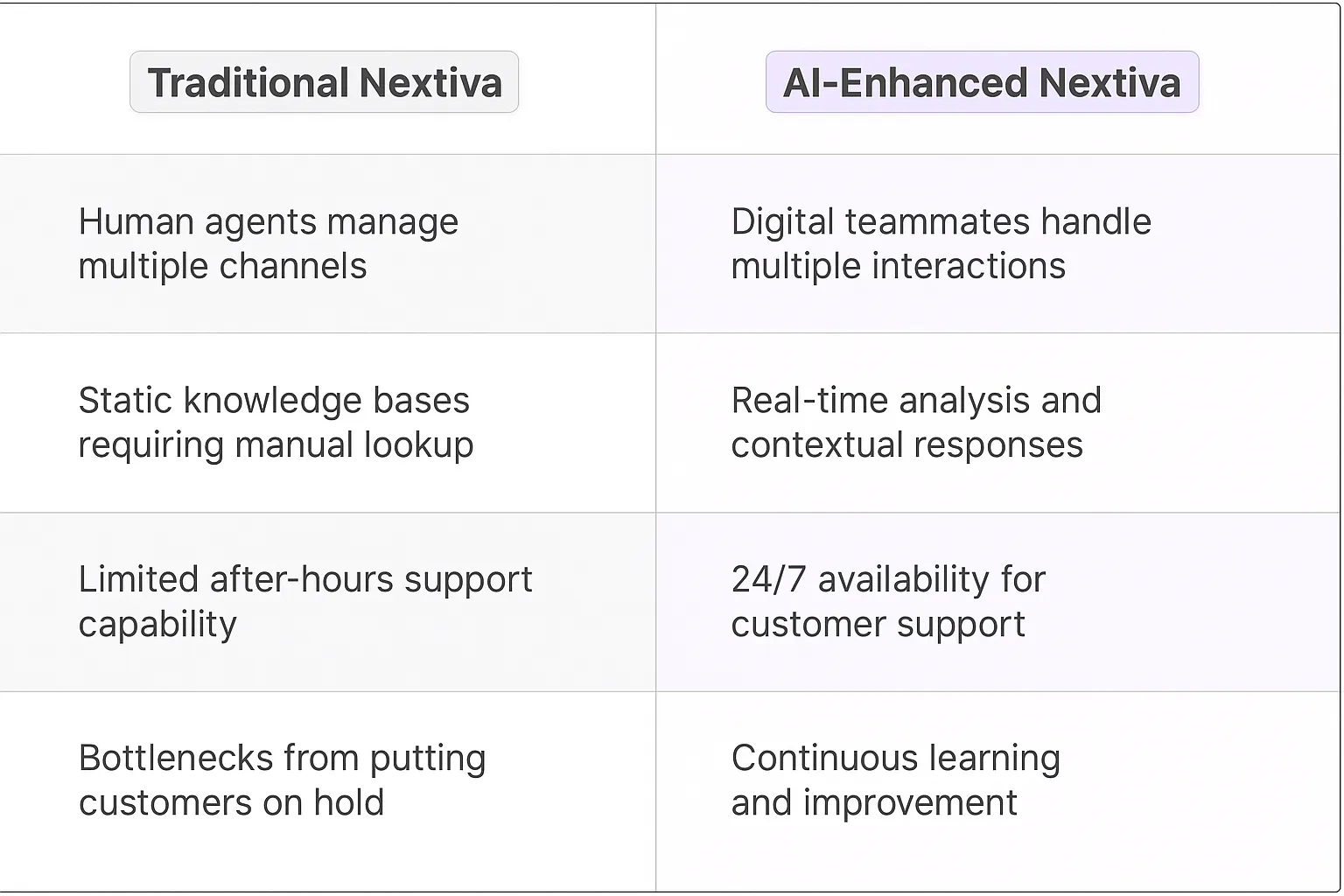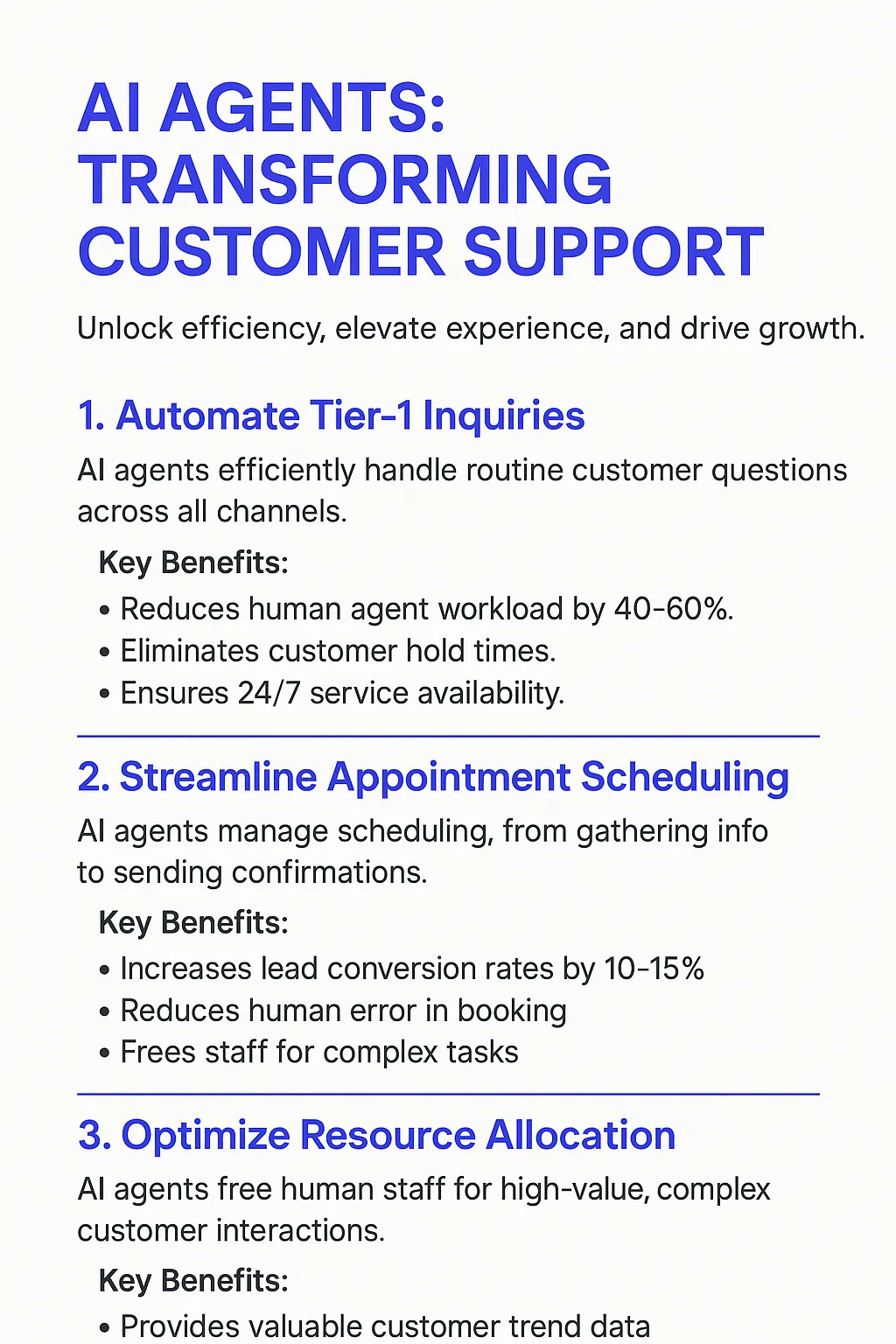Nextiva
Understanding Nextiva's Communication Platform
Nextiva stands as a comprehensive business communications platform that unifies voice, video, messaging, and collaboration tools. The platform serves as a central hub for customer interactions, team communication, and business operations, processing millions of interactions daily across organizations of all sizes.
Key Features of Nextiva
The platform combines enterprise-grade communication infrastructure with sophisticated AI capabilities. Core features include unified communications, advanced analytics, automated workflow management, and intelligent routing. The integration of AI Agents enhances these capabilities by adding contextual understanding, predictive analytics, and automated task handling across all communication channels.

Benefits of AI Agents for Nextiva
What would have been used before AI Agents?
Traditional customer communication through Nextiva relied heavily on human agents managing multiple channels simultaneously. Support teams juggled phone calls, emails, and chat messages while trying to maintain response quality and speed. They referenced static knowledge bases and documentation, often putting customers on hold to find the right information. This created bottlenecks, inconsistent responses, and limited after-hours support capability.
What are the benefits of AI Agents?
AI Agents transform Nextiva's communication platform by operating as digital teammates that enhance human capabilities rather than replacing them. They analyze conversation context and customer history in milliseconds, providing real-time insights that help resolve issues faster.
The most significant advantage comes from their ability to handle multiple customer interactions simultaneously while maintaining consistent quality. When a customer reaches out through Nextiva's platform, AI Agents can:
- Process natural language queries and provide accurate responses based on company knowledge bases
- Route complex issues to the right human specialist while handling routine requests independently
- Maintain context across multiple conversations and channels
- Learn from each interaction to improve future responses
- Scale support operations without proportionally increasing headcount
For businesses using Nextiva, this translates to tangible outcomes: reduced response times from hours to minutes, 24/7 availability for customer support, and more strategic use of human talent. Support teams can focus on complex problem-solving and relationship building while AI Agents handle routine inquiries.
The network effects are particularly powerful - as more customers interact with these AI Agents, the system becomes increasingly adept at understanding industry-specific terminology and common customer needs, creating a continuously improving support ecosystem.

Potential Use Cases of AI Agents with Nextiva
Customer Service Enhancement
AI Agents integrated with Nextiva's communication platform can handle tier-1 customer inquiries 24/7, analyzing call patterns and customer history to provide contextual responses. They excel at routing complex issues to the right human team members while managing routine requests like appointment scheduling, billing questions, and product information queries.
Sales Pipeline Management
Digital teammates within Nextiva can qualify leads by analyzing conversation data, identifying buying signals, and automatically updating CRM records. They track customer interactions across voice and digital channels, creating detailed engagement profiles that help sales teams focus on high-value opportunities.
Meeting Intelligence
AI Agents can join Nextiva calls to generate real-time transcripts, extract action items, and create follow-up task lists. They identify key discussion points, track commitment fulfillment, and maintain detailed interaction records for compliance and training purposes.
Automated Call Analysis
The AI system processes call recordings to surface trending topics, customer sentiment, and competitive intelligence. This analysis helps identify product feedback, training opportunities, and areas for service improvement without manual review of thousands of conversations.
Workflow Optimization
AI Agents monitor communication patterns to identify bottlenecks and suggest process improvements. They can automate routine tasks like scheduling, data entry, and report generation, allowing teams to focus on strategic activities that require human judgment.
Knowledge Base Management
Digital teammates continuously analyze support interactions to identify gaps in documentation and automatically generate new knowledge base articles. They keep content fresh by flagging outdated information and suggesting updates based on recent customer interactions.
Performance Analytics
AI systems provide detailed insights into team performance metrics, call quality scores, and customer satisfaction trends. They identify coaching opportunities and suggest targeted training interventions based on actual conversation data.
Compliance Monitoring
AI Agents scan communications for regulatory compliance, ensuring required disclosures are made and sensitive information is properly handled. They maintain audit trails and flag potential compliance issues for review.

Industry Use Cases
Nextiva's AI agents fundamentally transform how businesses handle communications and customer relationships. Drawing from my experience analyzing hundreds of SaaS companies, I've observed that the most impactful technology solutions address specific industry pain points rather than offering generic capabilities. The AI agents within Nextiva's ecosystem demonstrate this principle perfectly.
When we examine real-world applications, we see these digital teammates taking on crucial roles across different sectors - from handling complex insurance claims processing to managing high-volume retail customer inquiries. What makes these implementations particularly noteworthy is how they adapt to each industry's unique requirements, terminology, and compliance needs.
The following industry examples showcase not just automation, but intelligent collaboration between human teams and AI agents. This represents a fundamental shift in how businesses operate - moving beyond basic task completion to creating truly adaptive workflows that scale with organizational needs.
Let's dive into specific examples that demonstrate how different sectors leverage Nextiva's AI capabilities to solve their unique challenges while maintaining the human elements essential for meaningful customer relationships.
Healthcare Industry: Transforming Patient Care with Nextiva AI
The healthcare sector faces unique challenges around patient communication, appointment management, and care coordination. Medical practices juggling hundreds of patient interactions daily need intelligent systems that can maintain both efficiency and empathy.
A Nextiva AI agent deployed in a multi-physician medical practice demonstrates the profound impact on patient care delivery. The AI handles the complex dance of appointment scheduling by understanding natural language requests, checking provider availability in real-time, and confirming details with patients. When Mrs. Johnson calls about rescheduling her follow-up visit, the AI agent seamlessly checks her records, understands her care requirements, and finds available slots that work with both her schedule and her doctor's.
Beyond scheduling, the AI manages prescription refill requests by validating patient identity, checking medication history, and routing appropriate requests to providers for approval. This removes administrative burden from staff while maintaining strict HIPAA compliance and medical protocols.
The most compelling aspect is how the AI learns and adapts to each practice's specific workflows. It picks up on provider preferences, recognizes regular patients, and understands clinic-specific procedures. A pediatrician's office might need different protocols than a physical therapy practice - the AI adjusts accordingly.
The numbers tell the story: Medical practices using Nextiva AI agents typically see a 40% reduction in phone wait times and a 60% decrease in scheduling-related errors. More importantly, staff report having more time for direct patient interaction rather than administrative tasks.
This isn't just about automation - it's about augmenting human capabilities in healthcare delivery. When routine tasks are handled by AI agents, medical professionals can focus on what matters most: providing quality care to their patients.
Real Estate Industry: Scaling Property Management with Nextiva AI
Real estate firms manage an intricate web of property showings, tenant communications, and maintenance requests. The complexity multiplies with each new property added to a portfolio. A mid-sized property management company handling 500+ units demonstrates how Nextiva AI transforms this landscape.
The AI agent becomes the first point of contact for tenant interactions, handling maintenance requests with remarkable precision. When a tenant reports a leaking faucet at 2 AM, the AI analyzes the urgency, cross-references the property's maintenance protocols, and either schedules a repair during business hours or triggers emergency response for severe cases.
Property showings get a significant upgrade through intelligent scheduling. The AI coordinates between potential tenants, real estate agents, and current occupants, finding optimal viewing times while respecting everyone's schedules. It even follows up with feedback requests and nurtures leads who aren't ready to commit.
What's fascinating is the AI's ability to learn market patterns. It tracks which properties receive the most inquiries, common questions from prospective tenants, and peak showing times. This data helps property managers optimize their listings and showing schedules for maximum efficiency.
The metrics are compelling: Property management firms using Nextiva AI report a 45% reduction in response time to tenant inquiries and a 70% decrease in missed showing opportunities. The system handles an average of 200 tenant interactions daily, freeing up human agents to focus on relationship building and complex negotiations.
Most importantly, the AI maintains detailed records of all interactions, creating an audit trail that helps property managers stay compliant with local housing regulations while providing better service to both owners and tenants. This isn't about replacing property managers - it's about giving them the tools to scale their operations without sacrificing service quality.
Considerations and Challenges
Implementing Nextiva AI agents requires careful planning and strategic consideration across multiple dimensions. Organizations need to evaluate their readiness, infrastructure, and team dynamics before deployment.
Technical Considerations
Network infrastructure plays a crucial role in successful implementation. Organizations need sufficient bandwidth and reliable connectivity to handle real-time AI interactions. Legacy systems may require updates or replacements to ensure compatibility with Nextiva's AI architecture.
Data security becomes more complex with AI integration. Teams must establish robust encryption protocols and access controls while ensuring compliance with industry regulations like GDPR and CCPA. Regular security audits help identify potential vulnerabilities in the AI-human interaction points.
Operational Challenges
Change management emerges as a significant hurdle. Teams often experience initial resistance when adapting to AI-enhanced workflows. Creating clear communication channels and providing comprehensive training programs helps smooth the transition period.
Resource allocation requires careful balance. Organizations must dedicate time for initial setup, ongoing maintenance, and continuous optimization of AI models. This includes designating team members to monitor AI performance and handle edge cases that require human intervention.
Integration Complexities
API compatibility issues may arise when connecting Nextiva's AI agents with existing tools. Custom integrations often need development time and testing phases to ensure seamless data flow between systems.
Performance monitoring becomes more nuanced with AI systems. Traditional metrics may not capture the full scope of AI-human interactions, requiring new KPIs and evaluation frameworks to measure success effectively.
Cost Considerations
Budget planning must account for both direct and indirect costs. Beyond licensing fees, organizations should factor in training expenses, potential infrastructure upgrades, and ongoing optimization costs. ROI calculations need adjustment to reflect the long-term value of AI implementation versus short-term expenses.
The Future of AI-Enhanced Business Communication
The integration of AI Agents with Nextiva represents a fundamental shift in business communication. Organizations implementing these digital teammates report significant improvements in operational efficiency, customer satisfaction, and team productivity. The technology continues to evolve, learning from each interaction and adapting to industry-specific needs. Success in this new paradigm depends on thoughtful implementation, clear strategy, and a commitment to maintaining the balance between AI efficiency and human touch.













